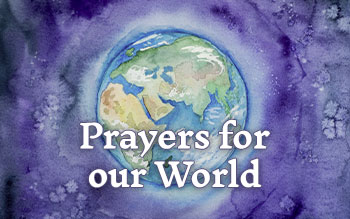Displaying items by tag: religious minorities
2022 events
The postponed Lambeth Conference should take place this summer, with Anglican bishops and archbishops coming to Canterbury for a once-in-a-decade event. Divides over sexuality indicate that some African bishops will boycott it. Same-sex partners of gay bishops are asked not to attend. Pray for Justin Welby to use Lambeth to foster greater unity. After two years of cancellations, Spring Harvest, New Wine and other Christian festivals plan to go ahead, after suffering huge financial losses. Persecution of religious minorities will be addressed as the UK hosts a global gathering of ambassadors for religious freedom. Pray for good to come from it. Evangelist Franklin Graham’s 2021 UK tour had to be cancelled following complaints that he spoke negatively about homosexuality and Islam. The tour is back on. More protests are to be expected, but Graham promises to speak of God’s love and nothing else.
China: harvesting human organs from religious minorities
China is killing religious and ethnic minorities and harvesting their organs, UN Human Rights Council told.
Lawyers for independent China Tribunal say UN member states have ‘legal obligation’ to act.
The Chinese government is harvesting and selling organs from persecuted religious and ethnic minorities on an industrial scale, the UN Human Rights Council has been told.
Speaking at the council’s headquarters in Geneva on Tuesday, lawyer Hamid Sabi presented the findings of the China Tribunal, an independent tribunal on allegations of forced organ harvesting.
Mr Sabi told the council that UN member states have a “legal obligation” to act after the tribunal’s final report in June found that “the commission of crimes against humanity against the Falun Gong and Uighur [minorities] had been proved beyond reasonable doubt”.
The China Tribunal was chaired by Sir Geoffrey Nice QC. It concluded that there was clear evidence China had been extracting organs from, and thereby killing, members of the Falun Gong spiritual group for at least 20 years, and that the practice was ongoing today.
Detainees were “killed to order - cut open while still alive for their kidneys, livers, hearts, lungs, cornea and skin to be removed and turned into commodities for sale”, the tribunal’s final judgement said.
The tribunal said there was also possible evidence, though in less volume, of forced organ harvesting in detainees from the Uighur Muslim minority, as well as Tibetans and some Christian sects.
China’s campaign of detention and “re-education” of more than a million Uighurs in the northwestern Xinjiang province has gained significant international attention and condemnation. The tribunal found evidence they were “being used as a bank of organs” and subjected to regular medical testing.
China has repeatedly denied the use of unethical organ transplant practices, and said that it stopped using the organs from executed prisoners in 2015. In a statement earlier this year, it accused the London-based China Tribunal of perpetuating “rumours”.
But Sir Geoffrey said the evidence collated by the tribunal meant the international community “can no longer avoid what it is inconvenient for them to admit”.
The organ transplant industry is estimated to earn China more than $1bn (£801.4m) a year, according to the tribunal. Sir Geoffrey called on the International Transplant Society and national medical associations dealing with transplant surgery to “face up to what is revealed in the China Tribunal judgment and act”.
The International Coalition to End Transplant Abuse in China (Etac), which initiated the China Tribunal, said it expects a private members bill to stop unethical organ tourism will be tabled in the UK parliament in October. Etac is hoping its findings will prompt the Human Rights Council to open up a UN Commission of Inquiry into forced organ harvesting in China, said Susie Hughes, the organisation’s executive director.
Adam Withnall Asia Editor - Independent
Pray: that the international community will take a stand against this shocking and inhumane treatment of minority groups.
Pray: for the ‘re-education projects’ to be closed and for the human rights of all people across China to be restored and respected.
Pray: Lets pray continually, for the church in China, that despite persecution, it will grow stronger. (Matt 5:10)
Iran: Outrage forces 'correction' of kindergarten directive
Images of a controversial administrative order went viral across Iranian social media in recent days, enraging large sections of the country's religious minorities and causing widespread public outrage. Iranian authorities had to revise the official order that sought to ban religious minorities from teaching at government-run kindergartens. A Zoroastrian parliamentarian reminded the government of a paragraph in the Iranian Constitution which advises against any form of discrimination and calls for equal opportunities. He also demanded Iran ‘will no longer witness such inhumane and unethical decisions against the followers of divine religions.’ Iran's religious minorities have experienced widespread discriminatory policies and practices. In particular, Baha'is, Zoroastrians, Sunni Muslims and of course Christians.
Iran: proposed changes in voting
Conservative MPs in Iran are proposing that Iranians should only be allowed to vote for members of their own religious group, making it impossible for members of religious minorities to be elected to any position of authority (90-95% of the population is Shia Muslim). Recently a Zoroastrian was suspended from the city council of Yazid, a historic city with many ancient Zoroastrian sites. The ruling clerics are becoming increasingly unpopular for taking harsher measures to block members of religious minorities from higher office. The proposal to force voters to vote for candidates from their own religious background would violate everyone’s democratic right to elect and be elected. Journalists, lawyers and some MPs have pointed to the presence of three Christians, a Jew and a Zoroastrian in Iran’s national parliament. The constitution currently allows each of the three minority groups a representative in parliament.



